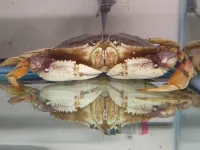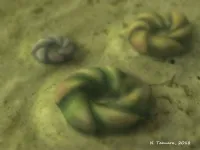(Press-News.org) A new U of T Scarborough study finds that climate change is causing a commercially significant marine crab to lose its sense of smell, which could partially explain why their populations are thinning.
The research was done on Dungeness crabs and found that ocean acidification causes them to physically sniff less, impacts their ability to detect food odours and even decreases activity in the sensory nerves responsible for smell.
“This is the first study to look at the physiological effects of ocean acidification on the sense of smell in crabs,” says Cosima Porteus, an assistant professor in the department of biological sciences at U of T Scarborough and co-author of the study along with postdoc Andrea Durant.
Ocean acidification is the result of the Earth’s oceans becoming more acidic due to absorbing increasing amounts of carbon dioxide in the atmosphere. It’s a direct consequence of burning fossil fuels and carbon pollution, and several studies have shown it’s having an impact on the behaviour of marine wildlife.
Dungeness crabs are an economically important species found along the Pacific coast, stretching from California to Alaska. They are one of the most popular crabs to eat and their fishery was valued at more than $250 million in 2019.
Like most crabs, they have poor vision, so their sense of smell is crucial in finding food, mates, suitable habitats and avoiding predators, explains Porteus. They sniff through a process known as flicking, where they flick their antennules (small antenna) through the water to detect odours. Tiny neurons responsible for smell are located inside these antennules, which send electrical signals to the brain.
The researchers discovered two things when the crabs were exposed to ocean acidification: they were flicking less and their sensory neurons were 50 per cent less responsive to odours.
“Crabs increase their flicking rate when they detect an odour they are interested in, but in crabs that were exposed to ocean acidification, the odour had to be 10 times more concentrated before we saw an increase in flicking,” says Porteus.
There are a few potential reasons why ocean acidification seems to be impacting sense of smell in crabs. Porteus points to other research done at the University of Hull that showed ocean acidification disrupts odour molecules, which can impact how they bind to smell receptors in marine animals such as crabs.
For this study, published in the journal Global Change Biology, Porteus and Durant were able to test the electrical activity in the crabs’ sensory neurons to determine they were less responsive to odours. They also discovered that they had fewer receptors and their sensory neurons were physically shrinking by as much as 25 per cent in volume.
“These are active cells and if they aren’t detecting odours as much, they might be shrinking to conserve energy. It’s like a muscle that will shrink if you don’t use it,” she says.
Porteus says reduced food detection could have implications for other economically important species such as Alaskan king and snow crabs because their sense of smell functions the same way.
“Losing their sense of smell seems to be climate related, so this might partially explain some of the decline in their numbers,” says Porteus.
“If crabs are having trouble finding food, it stands to reason females won’t have as much energy to produce eggs.”
This research was supported by the Natural Sciences and Engineering Research Council of Canada. Some of the analysis was performed at U of T’s Centre for the Neurobiology of Stress.
END
Crab populations are crashing. Could losing their sense of smell be one of the important reasons why?
New study looks at the physiological effects of ocean acidification on Dungeness crabs
2023-05-09
ELSE PRESS RELEASES FROM THIS DATE:
Program Announced for NUTRITION 2023 to be held July 22–25 in Boston
2023-05-09
How do our genes affect what we eat? Can more sustainable diets also improve health? What are the best foods for living longer, fighting cancer, and staying mentally sharp as we age?
You’ll find the answers to these questions and more at NUTRITION 2023, the annual flagship meeting of the American Society for Nutrition. Join us July 22-25 in Boston for an exciting lineup of scientific symposia, educational sessions, hot-topic discussions, and award lectures covering the latest developments in nutrition science.
Get a sneak peek at the ...
NYC Media Lab partners with Verizon to release free immersive educational content available to all US-based educators
2023-05-09
BROOKLYN, NEW YORK (May 9, 2023) — Today, the NYC Media Lab announced the availability of new immersive educational content for all US-based educators. Developed in partnership with Verizon for the $1M Museum Initiative, over 50 augmented reality (AR)- and virtual reality (VR)-focused lesson plans are available on Verizon Innovative Learning HQ (verizon.com/learning)—the free online education portal that brings next-gen learning to all.
Through the $1M Museum Initiative—a nationwide open call for museums and cultural institutions to develop ...
A new theory of what drives partisan conflict and hostility
2023-05-09
COLUMBUS, Ohio – Partisan conflict can be largely explained as differing views on two crucial tasks of society, according to a new theory developed by a pair of prominent social scientists.
In a new article published yesterday (May 8, 2023) in the journal Psychological Inquiry, Roy Baumeister and Brad Bushman say societies flourish by both amassing and distributing resources.
Conservatives focus on amassing resources, while liberals concentrate on distributing resources. The problem is both sides increasingly tend to disparage the value of what the other side champions, the authors said.
“Both tasks are absolutely essential for society,” ...
Earth’s first animals had particular taste in real estate
2023-05-09
Even without body parts that allowed for movement, new research shows — for the first time — that some of Earth’s earliest animals managed to be picky about where they lived.
These creatures from the Ediacaran Period, roughly 550 million years ago, are strangely shaped soft-bodied animals that lived in the sea. Researchers have long considered them enigmatic.
“It’s not like studying dinosaurs, which are related to birds that we can observe today,” said Phillip C. Boan, UC Riverside paleontology graduate student and lead author of the new study. “With these animals, because they have no modern descendants, we’re ...
Lifesaving solution dramatically reduces severe bleeding after childbirth
2023-05-09
A new solution, known as E-MOTIVE, could provide a major breakthrough in reducing deaths from childbirth-related bleeding, according to a landmark study published today by researchers from the World Health Organization (WHO) and the University of Birmingham.
Postpartum haemorrhage (PPH) - defined as the loss of more than 500 mL of blood within 24 hours after birth - is the leading cause of maternal mortality worldwide. It affects an estimated 14 million women each year and results in around 70 000 deaths – mostly in low and middle-income countries - equivalent to 1 death every 6 minutes
“Postpartum haemorrhage is scary, not always predictable, ...
Customizing T cell-based immunotherapies in a ‘SNAP’
2023-05-09
University of Pittsburgh researchers have developed a universal receptor system that allows T cells to recognize any cell surface target, enabling highly customizable CAR T cell and other immunotherapies for treating cancer and other diseases. The discovery could extend into solid tumors and give more patients access to the game-changing results CAR T cell therapy has produced in certain blood cancers.
Described in a Nature Communications study published today, the new approach involves engineering T cells with receptors bearing a universal ...
Does your vaccine type matter in the battle against COVID?
2023-05-09
COVID vaccines offered varying degrees of protection in the six months after patients receive them, with levels climbing and plunging in two cases and climbing and climbing in another. Age, sex, body mass index (BMI) and smoking status also play roles, according to new UC San Francisco research.
In the BOOST study (Building Optimal antibOdies STudy), researchers tracked the response to the Pfizer, Moderna and Johnson & Johnson vaccines in blood samples of 498 healthy volunteers, ages 18 to ...
Birmingham provides world-leading dental health expertise to Sigrid Therapeutics
2023-05-09
A world-leading oral health expert from the University of Birmingham, whose pioneering research concentrates on the link between oral health and non-communicable diseases such as diabetes, is to investigate the impact of a technology described as one of the biggest innovations in preventative dentistry since fluoride.
Professor Iain Chapple and his research group at the University’s School of Dentistry, will work with Sigrid Therapeutics to identify and develop further applications for a technology ...
Maynooth University research reveals cancer-killing benefits of popular obesity treatment
2023-05-09
Maynooth University’s Kathleen Londsdale Institute for Human Health Research has just published ground-breaking research into the benefits of the popular obesity treatment drug, GLP-1.
Previous research has found that people with obesity are at a greater risk of developing cancer, in part due to their anticancer immune cell -- better known as the ‘Natural Killer (NK)’ cell -- being rendered useless due to their disease.
New Health Research Board (HRB) funded research carried out by Dr Andrew Hogan ...
The brain reacts differently to touch depending on context
2023-05-09
The touch of another person may increase levels of the “feelgood” hormone oxytocin. But the context really matters. The situation impacts oxytocin levels not only in the moment, but also later, as is shown by researchers at Linköping University and the University of Skövde in Sweden. Their study has been published in the scientific journal eLife.
An embrace from a parent, a warm hand on your shoulder or a caress from a romantic partner are examples of how touch can strengthen social bonds between people and influence emotions. ...
LAST 30 PRESS RELEASES:
GLP-1 drugs associated with reduced need for emergency care for migraine
New knowledge on heritability paves the way for better treatment of people with chronic inflammatory bowel disease
Under the Lens: Microbiologists Nicola Holden and Gil Domingue weigh in on the raw milk debate
Science reveals why you can’t resist a snack – even when you’re full
Kidney cancer study finds belzutifan plus pembrolizumab post-surgery helps patients at high risk for relapse stay cancer-free longer
Alkali cation effects in electrochemical carbon dioxide reduction
Test platforms for charging wireless cars now fit on a bench
$3 million NIH grant funds national study of Medicare Advantage’s benefit expansion into social supports
Amplified Sciences achieves CAP accreditation for cutting-edge diagnostic lab
Fred Hutch announces 12 recipients of the annual Harold M. Weintraub Graduate Student Award
Native forest litter helps rebuild soil life in post-mining landscapes
Mountain soils in arid regions may emit more greenhouse gas as climate shifts, new study finds
Pairing biochar with other soil amendments could unlock stronger gains in soil health
Why do we get a skip in our step when we’re happy? Thank dopamine
UC Irvine scientists uncover cellular mechanism behind muscle repair
Platform to map living brain noninvasively takes next big step
Stress-testing the Cascadia Subduction Zone reveals variability that could impact how earthquakes spread
We may be underestimating the true carbon cost of northern wildfires
Blood test predicts which bladder cancer patients may safely skip surgery
Kennesaw State's Vijay Anand honored as National Academy of Inventors Senior Member
Recovery from whaling reveals the role of age in Humpback reproduction
Can the canny tick help prevent disease like MS and cancer?
Newcomer children show lower rates of emergency department use for non‑urgent conditions, study finds
Cognitive and neuropsychiatric function in former American football players
From trash to climate tech: rubber gloves find new life as carbon capturers materials
A step towards needed treatments for hantaviruses in new molecular map
Boys are more motivated, while girls are more compassionate?
Study identifies opposing roles for IL6 and IL6R in long-term mortality
AI accurately spots medical disorder from privacy-conscious hand images
Transient Pauli blocking for broadband ultrafast optical switching
[Press-News.org] Crab populations are crashing. Could losing their sense of smell be one of the important reasons why?New study looks at the physiological effects of ocean acidification on Dungeness crabs




